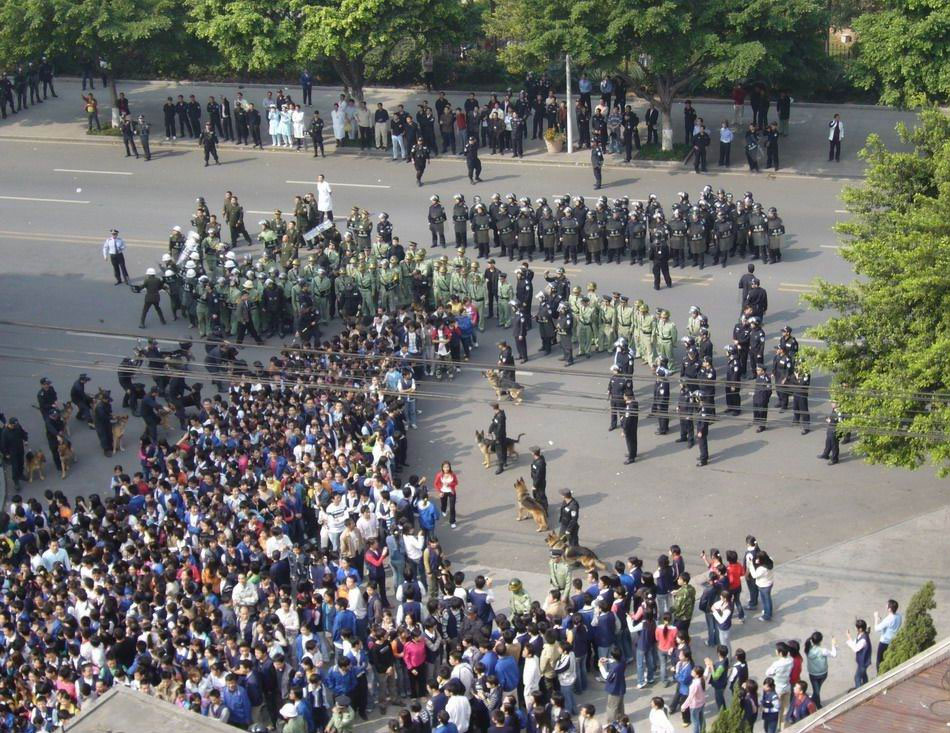
China


By Li Hong
June 7, 2010 -- People's Daily -- Wherever exists exploitation and suppression, rebellion erupts. If the exploited are a majority of the society, the revolt draws even nearer and comes with a louder bout. For the past 30 years witnessing China's meteoric rise, multinationals and upstart home tycoons have rammed up their wealth making use of China's favourable economic policies as well as oversight loopholes. In sharp contrast, tens of millions of Chinese blue-collar workers who have genuinely generated the wealth and created the prosperity have been left far behind.

By Martin Hart-Landsberg
[A version of this article appeared in the South Korean journal, Marxism 21. It has been posted at Links International Journal of Socialist Renewal with Martin Hart-Landsberg’s permission.]
February 2010 -- The consensus among economists is that China’s post-1978 market reform policies have produced one of the world’s greatest economic success stories. Some believe that China is now capable of serving as an anchor for a new (non-US dominated) global economy. A few claim that the reform experience demonstrates the workability (and desirability) of market socialism. This paper is critical of these views.
By Reihana Mohideen
March 8, 2010 -- Despite the fanfare about Asia’s "miracle" economies, the problem of "missing women and girls" is actually growing, according to the United Nations Development Program-sponsored 2010 Asia-Pacific Human Development Report.
These "missing" girls and women are a result of the abortion of girl fetuses and women dying through sheer neglect – underfed and starved and not receiving adequate health care. The birth gender disparity is the highest in East Asia, home of the Asian "miracle" economies, where 119 boys are born for every 100 girls. China and India, much touted for their economic success, account for 85 million of these 100 million "missing" women.
Eric Toussaint interviewed by Igor Ojeda for the Brazilian weekly paper Brasil de Fato. Translated from French by Judith Harris and Chris

By Roy Wilkes
December 27, 2009 -- Socialist Resistance -- Something rotten happened in Denmark. The fifteenth session of the Conference of the Parties (COP15), in which so many had invested so much hope, began as farce and ended in tragedy. Anyone who still had the faintest illusion that the climate crisis could be resolved within capitalism has now seen it fatally dashed against the rocks of Copenhagen.
Of course, our rulers cannot blame themselves for this fiasco. So, who then is to blame? “China”, screams a furious Ed Milliband [the British Labour government's Secretary of State for Energy and Climate Change] upon his return to London, with the media machine joining the chorus. Blame China! Blame Venezuela! Blame the poor countries who obstructed "The Deal"! Blame the victims who dared to ask for a 1.5 degree C limit, those unrealistic fools who dared to ask to be allowed to live.

By Radhika Krishnan
December 24, 2009 -- Communist Party of India (Marxist-Leninist) Liberation -- The 15th Conference of Parties (COP15) has finally ended in Copenhagen, and it is now time to officially write the obituary. This week-long conference, where 110 countries got together to try and evolve a blueprint to handle the climate change crisis, has quite predictably and most unfortunately ended in failure. Predictable, because for a long time now there have been indications that the US would continue to hold the rest of the world to ransom by refusing to accept responsibility for its role in creating the climate crisis.
November 13, 2009 -- Links International Journal of Socialist Renewal has published a number of articles on the Chinese Revolution and the subsequent restoration of capitalism in China.[1] This article aims to give more detail on the current situation, including the Chinese government's efforts to ameliorate some of the harmful effects of capitalism. But first I will briefly recount the process of capitalist restoration.


[Click HERE for more analysis of the Chinese Revolution and its evolution.]
By Chris Slee
September 23, 2009 -- October 1 will mark 60 years since Mao Zedong proclaimed the creation of the People's Republic of China. This followed the victory of the People’s Liberation Army, led by the Communist Party of China (CCP), over the US-backed Kuomintang (Chinese Nationalist Party, KMT).
In 1921, when the CCP was founded, China was in chaos. Western intervention — military, economic, political and cultural — had destroyed or undermined traditional Chinese institutions. New, stable institutions had not been created. Various imperialist powers grabbed pieces of Chinese territory.
Some modern industry was established, mainly in the coastal cities. But most Chinese people were peasants, heavily exploited by big landowners.

Youth demonstrate during the Cultural Revolution.
[Click HERE for more analysis of the Chinese Revolution and its evolution.]
By Pierre Rousset
With the proclamation of the People’s Republic of China on October 1, 1949, the Chinese Communist Party (CCP) found itself at the head of a country three times larger than Western Europe, with a population of some 500 million. The internal situation was favourable to the revolutionary regime. At the end of a long series of civil and foreign wars, the population sought and relied on the new leaders to achieve peace while the ongoing people’s mobilisation opened the way for a deep reform of society.
